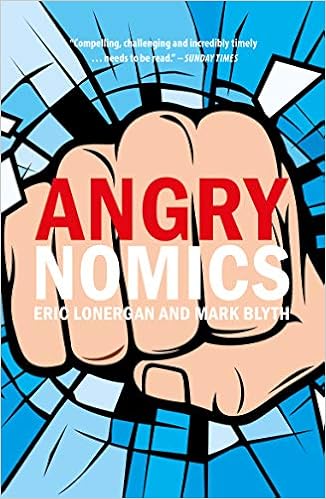
Description
With considerable sophistication and a good dose of humour, this book dissects the popular anger that has made our economics unsustainable and our politics dysfunctional. Lonergan and Blyth rightly call for a reset of our current model of capitalism. To their great credit, they also provide creative – and practical – ideas for moving forward. -- Dani Rodrik, Harvard UniversityIn a series of brilliant Socratic dialogues peppered with a score of real-world stories Lonergan and Blyth explain the roots of our current anger – anger over austerity policies, job losses, stagnant wages, million-dollar salaries for the few, broken health systems for the many. But also anger about an economic ideology and political system that seem to ignore people as they are. What to do next? How to reset the system? Never were the answers to such questions more urgent. -- Branko Milanovic, Graduate Center, City University of New YorkThis is an excellent, thought-provoking book that should be read by anyone with an interest in economics or politics. 'Angrynomics' is a new term to me but one that should be at the heart of political debate. -- Philip Coggan, author of More and The Money MachineEverything it addresses – the causes of western democratic anger and how to fix it – has been magnified by the lockdown and the resulting economic deep freeze ... This book is that rare pre-Covid-19 manuscript that has been made fortuitously more relevant by the virus ... Most of us take it for granted that we live in an angry world. Their book makes an optimistic case for how we can escape it ... In recent years, the toxic sense that people are voiceless and action is futile has paralysed our democracies. Angrynomics is a rebuke to that ‘failure of the mind’. -- Ed Luce, Financial TimesA compelling, challenging and incredibly timely book – needs to be read. -- Matthew Goodwin, Sunday TimesBeautifully simple, logical and absolutely doable ideas zip off the pages of a new book by two of the most thoughtful economists in the game ... they are a formidable combination. -- David McWilliams, Irish TimesA rip-roaring read. -- Diane Coyle, www.enlightenmenteconomics.comInequality is anger's seed, but it sprouts into rage when people believe that the system is rigged against them ... Lonergan and Blyth have an ingenius solution. -- Philip Aldrick, The TimesFramed as a dialogue between a hedge fund manager (Lonergan) and a political scientist (Blyth), this equally entertaining and rigorous book locates the roots of today’s angry, antiestablishment politics in macroeconomic and financial instability, technological change, and rising inequality, which together have created a sense of economic exclusion and insecurity ... it offers novel policies for stabilizing the economy and for addressing stagnation and insecurity. -- Foreign Affairs Eric Lonergan is a policy economist and author, with over twenty years' experience in financial markets. He is co-author with Mark Blyth of the international bestseller, Angrynomics. He has written extensively on innovations in monetary policy and frequently contributes to the Financial Times. Mark Blyth is the William R. Rhodes ’57 Professor of International Economics at Brown University. He is the author of Austerity: The History of a Dangerous Idea (2013/2015).
Features & Highlights
- Why are measures of stress and anxiety on the rise, when economists and politicians tell us we have never had it so good? While statistics tell us that the vast majority of people are getting steadily richer the world most of us experience day-in and day-out feels increasingly uncertain, unfair, and ever more expensive. In
- Angrynomics
- , Eric Lonergan and Mark Blyth explore the rising tide of anger, sometimes righteous and useful, sometimes destructive and ill-targeted, and propose radical new solutions for an increasingly polarized and confusing world.
- Angrynomics
- is for anyone wondering, where the hell do we go from here?





